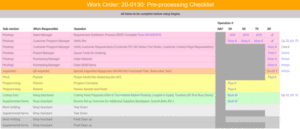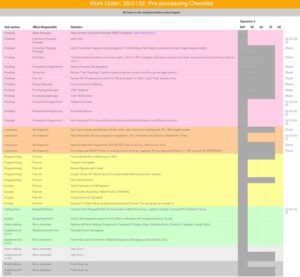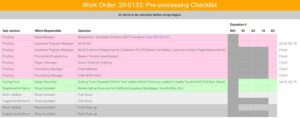Process
& Scheduling
Management
Maintenance
Management
& Inspection
& Material Planning
Financial Data
Management
Author: Paul Van Metre

How many times has it happened in your shop that you go to set-up a job, only to realize that you’re missing a special tap? Or maybe a thread gage, or a custom ground tool? Or anything else you might not normally need. Or even the material – which you definitely normally need!?!
For many shops this is a weekly or even daily occurrence. It wreaks havoc on your schedule, your on-time delivery score with your customers, and the profitability of your jobs. You may need to pull the setup off the machine and put on a different job. Or you overnight a special tool for early AM delivery so you can get back on the job as soon as possible. And the machine sits and waits for hours, waiting for that $20 tap which costs $60 to ship overnight. The downtime on your spindle will never be recovered, the $60 shipping fee is straight out of your profit margin, and you’re now a day behind schedule which means you might be late to your customer. Or you’ll have to pay a $100 expedite fee to your anodizer to make up the difference. In short, it’s a bad situation.
This situation is a prime example of a shop that doesn’t have the systems in place to eliminate this problem from happening. And it results in a frequent reactive situation, rather than being proactive. But it’s very common because it’s a complicated process to manage and ERP software tools don’t help with this level of detail. But, with ProShop, it’s entirely avoidable.
ProShop ERP was designed and built on the shop floor of a job shop for 17 years. We dealt with these types of problems every day. We processed thousands of jobs per year and every one of them had the potential to go sideways, be late, and lose money. So we built software solutions to help eliminate those potential problems. One critical tool we call the Pre-Processing Checklist. This is a checklist that helps employees make sure they’re doing the things they need to do, and allows everyone else to know what the status is of the checklist. It’s designed to be checked off, at various stages, by different people, before a job is ready to be processed on a manufacturing workstation.
The checklist is made of several color-coded sections:
As the work gets completed and checked off, the color codes on each job update, as does the schedule for those jobs. It’s easy for people to see the latest status and make good decisions about job scheduling. In the image below, the fact that the job circled in red is scheduled to go on the machine tomorrow, but the bar is pink, is a major problem. It indicates that the CNC programming process isn’t done yet, nor is the job prepped for the machine. The setup is not likely to go well, and it’s plainly visible to anyone looking at the schedule so action can be taken.

Just as importantly, the items on the checklist are customizable, based on the type of job you’re processing. For example, a repeat production job should have a much smaller list of items to do, than a brand new production job you’re running for the first time. There is no program to be done or fixtures to be made.
Here is an example checklist for a first run job:

Here is an example checklist for a repeat job:

We don’t want to introduce items to be checked off, just for the sake of checking boxes. The objective is to just do the minimum amount that is necessary and prudent to ensure success and efficiency for the type of job being processed. In addition to the customization by work order type, the entire checklist is configurable for any type of job that can be imagined.
By getting into the habit of using this Pre-Processing Checklist, and becoming more proactive rather than reactive with job preparation, ProShop customers see dramatic improvements in setup time, as well as reductions in those fees needed to respond to last-minute changes. Customers have reported reductions in setup of 25-50% and reductions in UPS Red charges and outside process expedite fees of over 90%. Often more than covering the entire subscription costs for ProShop. With the cost savings typically realized, as well as the reduction in stress from eliminating last-minute fire drills, the Pre-Processing Checklist becomes a beloved feature that shops rely on every day to make their jobs easier and more profitable.


